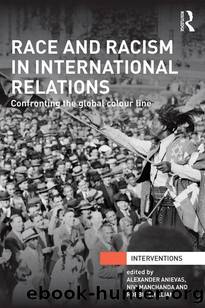Race and Racism in International Relations (Interventions) by unknow

Author:unknow
Language: eng
Format: epub
Publisher: Taylor and Francis
Published: 2014-10-29T18:30:00+00:00
Should we do away with race?
Every scholar of the global colour line must come to terms with the politics of antiracism: What role, if any, should race play in the pursuit of social justice? Should we abandon racially divided societies and move toward colour blindness? How ought we to approach development or multiculturalism? This inevitability of politics can be stated more broadly. According to Mallon (2006), rather than being about semantics or ontology, the philosophical debate on race is mainly normative. This is to say that the ontological consensus still leaves us with a dissensus regarding moral, practical, prudential and, indeed, political implications of race-talk. The relevance of this debate is self-evident: what concept â or concepts â best suits our anti-racist aims? To paraphrase Mallon, the penultimate question in the philosophy of race is neither âWhat do we mean by race?â nor âIs race an illusion?â but âWhat do we want race to be?â (Mallon 2006, 550).
In lieu of an answer, Mallon urges us to consider the basic normative parameters such as the epistemic and political value of race-talk (whether its meanings could be more effectively subsumed under a different kind, namely ethnicity, and whether it helps in dealing with racism and its legacies) and the degree of entrenchment of race-talk in everyday discourse, both public and private. On these parameters, scholars tend to be divided into two main camps. âConservationistsâ maintain that racial categories should be conserved for the purposes of public policy analysis, social reform and/or identity-based politics (Mills 1997). In contrast, âeliminativistsâ â a catch-all term that sometimes includes political liberals, postcolonial theorists and conservative polemicists â contend that race is an illusion laden with disagreeable claims and, as such, should be eliminated from public discourse.
The problem with the eliminativist position from the perspective of the study of the global colour line is that it erases the philosophical and theoretical basis for anti-racist politics that is supposed to motivate scholarship in the first place. This is a major normative argument for conserving race that goes back to Du Bois: critical confrontation with race is the necessary step in the possibilities of overcoming the problem of race. What also needs emphasising is that conservationist race-talk consciously seeks to avoid any reference to nineteenth-century racial meanings or, for that matter, the language emerging from contemporary genomics. The concept of racialisation serves so many philosophers well â think of Lawrence Blumâs (2002) racialised groups, Linda MartÃn Alcoffâs (2006) racialised identities, Glasgowâs (2009) asterisked ârace*â and even Appiahâs (1996) racial identities â precisely because it so clearly emphasises the fact that race is a socially and politically constructed phenomenon. The normative goal here is not to âconserveâ race so much as to âsubstituteâ it with race-like discourse.
One candidate is class. This substitutionist move has a long pedigree. Robert Miles (1989), for example, has long demanded that race be replaced with racism defined as an ideological struggle within contemporary capitalism. Miles developed his concept of racialisation precisely in order to explain
Download
This site does not store any files on its server. We only index and link to content provided by other sites. Please contact the content providers to delete copyright contents if any and email us, we'll remove relevant links or contents immediately.
| Anthropology | Archaeology |
| Philosophy | Politics & Government |
| Social Sciences | Sociology |
| Women's Studies |
Nudge - Improving Decisions about Health, Wealth, and Happiness by Thaler Sunstein(6634)
iGen by Jean M. Twenge(4702)
The Fire Next Time by James Baldwin(4343)
Adulting by Kelly Williams Brown(3671)
The Sports Rules Book by Human Kinetics(3588)
The Hacking of the American Mind by Robert H. Lustig(3580)
The Ethical Slut by Janet W. Hardy(3504)
Captivate by Vanessa Van Edwards(3298)
Mummy Knew by Lisa James(3168)
In a Sunburned Country by Bill Bryson(2948)
Ants Among Elephants by Sujatha Gidla(2925)
The Worm at the Core by Sheldon Solomon(2918)
Suicide: A Study in Sociology by Emile Durkheim(2610)
The Slow Fix: Solve Problems, Work Smarter, and Live Better In a World Addicted to Speed by Carl Honore(2574)
Humans of New York by Brandon Stanton(2379)
Handbook of Forensic Sociology and Psychology by Stephen J. Morewitz & Mark L. Goldstein(2377)
Blackwell Companion to Sociology, The by Judith R. Blau(2319)
The Happy Hooker by Xaviera Hollander(2274)
Outliers by Malcolm Gladwell(2258)
